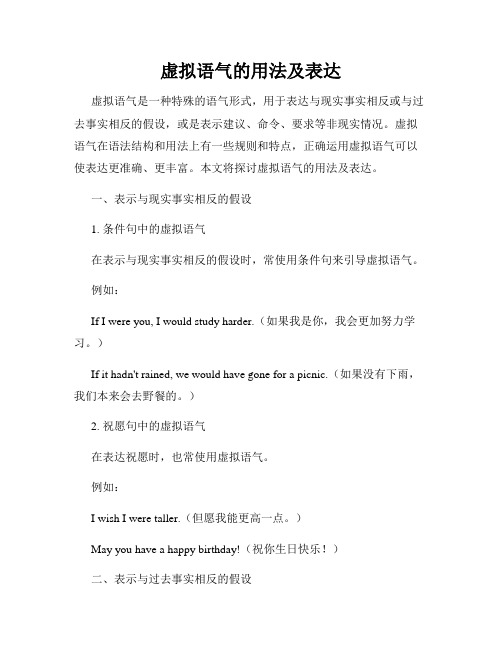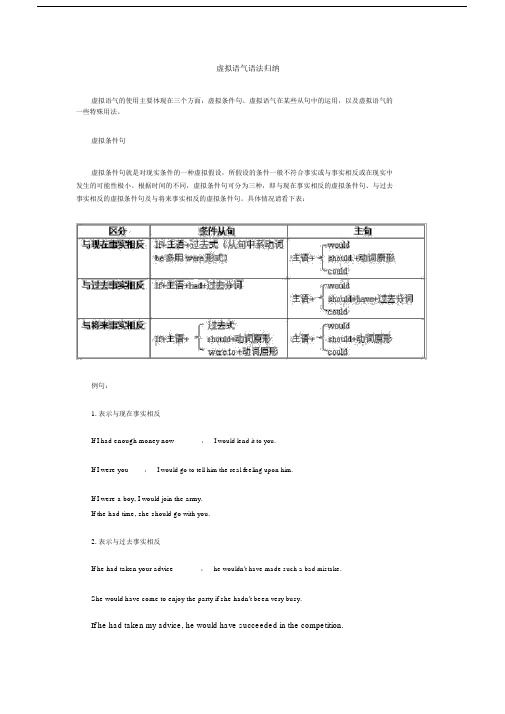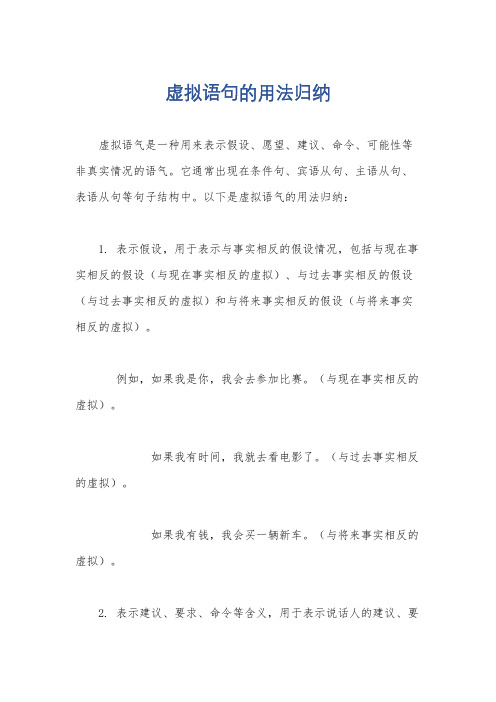虚拟语气用法总结(超好_原创)
虚拟语气的用法及表达

虚拟语气的用法及表达虚拟语气是一种特殊的语气形式,用于表达与现实事实相反或与过去事实相反的假设,或是表示建议、命令、要求等非现实情况。
虚拟语气在语法结构和用法上有一些规则和特点,正确运用虚拟语气可以使表达更准确、更丰富。
本文将探讨虚拟语气的用法及表达。
一、表示与现实事实相反的假设1. 条件句中的虚拟语气在表示与现实事实相反的假设时,常使用条件句来引导虚拟语气。
例如:If I were you, I would study harder.(如果我是你,我会更加努力学习。
)If it hadn't rained, we would have gone for a picnic.(如果没有下雨,我们本来会去野餐的。
)2. 祝愿句中的虚拟语气在表达祝愿时,也常使用虚拟语气。
例如:I wish I were taller.(但愿我能更高一点。
)May you have a happy birthday!(祝你生日快乐!)二、表示与过去事实相反的假设在虚拟语气中,过去完成时常用来表示对过去已经发生的事情的假设。
例如:If I had known, I would have helped you.(如果我知道的话,我会帮助你的。
)2. 用于动词wish的虚拟语气在表达对过去事实的遗憾或不满时,常常使用与wish连用的虚拟语气。
例如:I wish I hadn't made that mistake.(但愿我没有犯那个错误。
)三、表示建议、命令、要求等非现实情况1. 虚拟语气的动词形式在表示建议、命令、要求等非现实情况时,常使用should或者虚拟语气的动词形式。
例如:I suggest that he should go to bed early.(我建议他早点睡觉。
)It's important that you be there on time.(你准时到场很重要。
)在表示否定的建议、命令、要求等非现实情况时,常使用虚拟语气的否定形式。
高中虚拟语气详细总结

高中虚拟语气详细笔记用法及动词形式1、表示与现在事实相反的情况:从句:主语+过去时主句:主语+should/would/could/might+doeg:1.If I were you, I would take an umbrella.如果我是你,我会带把伞。
(事实:我不可能是你)2.If I knew his telephone number, I would tell you.如果我知道他的电话号码,我就会告诉你。
(事实:不知道)3.If there were no air or water, there would be no living things on the earth.如果没有水和空气,地球上就不会有生物。
(事实:地球上既有空气也有水)4.If I had any money with me, I could lend you some.如果我带钱了,我就会借给你些。
(事实:没带钱)5.If he studied harder, he might pass the exam.如果他再努力些,就能通过考试了。
(事实:没有努力)2、表示与过去事实相反的情况从句:主语+had done主句:主语+should/would/could/might+have doneeg:1. If I had gotten there earlier, I should/could have met her. 如果我早到那儿,我就会见到她。
(事实:去晚了)2.If he had taken my advice, he would not have made such a mistake. 如果他听我的劝告的话,就不会犯这样的错误了。
(事实:没有听我的话)3、表示对将来情况的主观推测从句:①if+主语+were to do 主句:①主语+should/would/could/might+do②if+主语+did/were ②主语+should/would/could/might+do③if+主语+should+do ③主语+should/would/could/might+doeg:1.If he should come here tomorrow, I would talk to him.如果他明天来这儿的话,我就跟他谈谈。
(完整版)虚拟语气语法归纳..doc

虚拟语气语法归纳虚拟语气的使用主要体现在三个方面:虚拟条件句、虚拟语气在某些从句中的运用,以及虚拟语气的一些特殊用法。
虚拟条件句虚拟条件句就是对现实条件的一种虚拟假设,所假设的条件一般不符合事实或与事实相反或在现实中发生的可能性极小。
根据时间的不同,虚拟条件句可分为三种,即与现在事实相反的虚拟条件句、与过去事实相反的虚拟条件句及与将来事实相反的虚拟条件句。
具体情况请看下表:例句:1.表示与现在事实相反If I had enough money now,I would lend it to you.If I were you,I would go to tell him the real feeling upon him.If I were a boy, I would join the army.If the had time, she should go with you.2.表示与过去事实相反If he had taken your advice,he wouldn't have made such a bad mistake.She would have come to enjoy the party if she hadn't been very busy.If he had taken my advice, he would have succeeded in the competition.3.表示与将来事实相反I would go shopping with you if it were to be Sunday tomorrow.If he were to be given another chance to do it again,he could certainly achieve more.If it were to rain tomorrow, the football match would be put off.1.虚拟条件句的倒装在虚拟条件句中,为了强调所假设条件的虚拟性,或突出说话人的一种主观愿望,虚拟条件句可用倒装结构。
高中英语知识点归纳虚拟语气的用法

高中英语知识点归纳虚拟语气的用法虚拟语气是英语语法中的一个重要概念,用于表达虚假、条件或假设等非真实情况。
在高中英语教学中,虚拟语气的用法被广泛涉及。
本文将归纳总结高中英语中常见的虚拟语气用法,以便帮助学生更好地掌握和应用。
一、虚拟语气在条件句中的用法1. 第一类虚拟条件句第一类虚拟条件句表示与现在事实相反的假设情况,即主句谓语动词用一般过去时,条件句用“动词过去式”或“were”。
例句1:If I had more time, I would travel around the world.如果我有更多的时间,我会周游世界。
例句2:If he were here, he would help you.如果他在这里,他会帮助你。
2. 第二类虚拟条件句第二类虚拟条件句表示与过去事实相反的假设情况,即主句谓语动词用“过去完成时”,条件句用“过去完成时”或“动词过去完成式”。
例句1:If I had studied harder, I would have passed the exam.如果我学得更刻苦,我就会通过考试了。
例句2:If she had taken the bus, she wouldn't have been late.如果她坐公交车,她就不会迟到了。
二、虚拟语气在建议、命令和要求中的用法虚拟语气在建议、命令和要求中的用法是表示一种非真实或非直接的语气,用于表达对诉求对象的建议、命令或要求。
例句1:I suggest that he go to bed early.我建议他早点上床睡觉。
例句2:The teacher insisted that the students hand in their homework on time.老师坚持要求学生们按时交作业。
三、虚拟语气在感叹句中的用法虚拟语气在感叹句中的用法用于表达对现实情况的不满或对希望的夸大。
例句1:If only I were a bird and could fly freely in the sky!如果我是一只鸟,能自由地在天空中飞翔该多好啊!例句2:How I wish I had a magic wand to make all my dreams come true!我多希望我有一根魔法棒,让我的梦想都实现!四、虚拟语气在建立条件句中的用法虚拟语气在建立条件句中的用法用于建立一种假设条件,以进一步推断结果。
高中英语知识点归纳虚拟语气的用法及常见表达方式

高中英语知识点归纳虚拟语气的用法及常见表达方式虚拟语气在高中英语中是一个重要的语法知识点。
它在表达与现实相反的情况、假设、建议和愿望等方面起到了重要作用。
本文将详细介绍虚拟语气的用法及常见表达方式。
一、虚拟语气的基本形式在英语中,虚拟语气的基本形式包括虚拟条件句和虚拟语气在从句中的使用。
1. 虚拟条件句虚拟条件句通常包括三个主要部分:if引导的条件从句、主句中的would/should/could/might以及从句中的动词形式(常为过去式或were)。
例如:- If I had more money, I would travel around the world.(如果我有更多的钱,我会周游世界。
)2. 虚拟语气在从句中的使用虚拟语气在从句中的使用主要是通过动词的变化形式来表达。
常见的动词形式包括:过去式、were(用于所有人称)、should/ought to。
例如:- I wish I could speak fluent French.(我希望我能说一口流利的法语。
)二、虚拟语气的用法虚拟语气在英语中的使用具有一定的规则和情境。
下面将介绍几种常见的情况。
1. 表达与现实相反的情况- If I were you, I would quit that job immediately.(如果我是你,我会立刻辞职。
)该句中,使用了“were”而不是“was”,表示与当前事实相反的情况。
2. 表达假设和想象- If I had a time machine, I would go back to the past.(如果我有时光机器,我会回到过去。
)该句中,使用了“had”而不是“have”,表示假设的情况。
3. 表达建议和命令- The teacher suggested that we should study harder for the exam.(老师建议我们应该更加努力地学习考试。
)该句中,使用了“should”来表示建议。
(word完整版)英语虚拟语气语法归纳总结,文档

(word完满版)英语虚假语气语法归纳总结,文档虚假语气 :表示说的话不是事实,不可以能发生也许说可能性很小的情况,表达一种梦想、建议、假设。
一、条件状语从句中的用法从句谓语形式主句谓语形式现在were/ did would/could/should(+not)+ do过去had donewould/could/should/might(not)+ have done将来 1.were/did would/could/should/might2.should do(not)3.were to do+ do简单记法:if were/did, would doif had done, would have doneif were to do/should do, would do举例:If I were you, I would do nothing about it.If you had taken your teacher’ s advice, you wouldn’ t have made such a mistake.If it were to/ should rain tomorrow(表示降水率很低 ),they wouldn’ t go shopping.附注:虚假语气,条件状从倒装状语从句中,去掉if,提前were/ had/ should如: If I were you, I would give up.→Were I you, I would give upIf you had taken the advice, you would have .→ Had you taken the advice, you would haveIf the world should come to an end,→ Should the world come to an end别的, without, but for, otherwise 构成的条件状语从句中,也有委宛的虚假语气But for the popularization of electricity, we would lead a whole different life today. (popularization 普及, publicity 宣传 )Without your help, I would have failed.We’ ll go earlier, otherwise we wouldn’〔tget表示a可seat能性.小〕但其实,高中英语考试也常考:错综虚假语气条件句即:假设条件状从发生的时间与所假设的谓语动词不一致,此时,主句和从句要依照各自的时间而定。
虚拟语气讲义(15个句式)

虚拟语气讲义(15个句式)虚拟语气讲义1.虚拟语气句型1If + were/ did/ (动词的过去式), 主语+would/ might/ should / could + do 。
(表示对现在的假设)eg. If I were you, I would not be so proud . 如果我是你,我不会如此自负.eg. I don’t have a cellphone. If I had one , it would be convenient for me to get in touch with others 我没有手机,如果我有手机的话,和别人联系就方便的多了。
eg. If I were in your position, I would think better of it .如果我处在你现在的境地,我会重新考虑然后放弃。
2. 虚拟语气句型2If + had done, 主语+would/ might/ should / could + have done表示对过去或已经发生事情的虚拟假设。
eg. What a pity it is that you didn’t attended the concert yesterday! If you had attended the concert, you would have seen the famous singer.真遗憾你昨天没有去听音乐会。
如果你去了,你就会见到那位名歌手。
eg. Anyone in his position would have done the same= If anyone had been in his position, he would have done the same.3. 虚拟语气句型3If + were/ did(动词过去式)/should/ were to do , 主语+would/ might/ should / could + do (表示对将来的假设).eg. If he should refuse (= if he were to refuse = if he refused ),it wouldn’t matter 万一他拒绝了. 那也没有什么关系.eg. If you shouldn’t pa ss the college entrance examination, what would you do?万一你高考不中,你该怎么办?4. 虚拟语气条件句的倒装在虚拟条件句中,如果出现有were, had, should,可省去if,可将主语与这些词倒装,构成虚拟倒装句。
虚拟语句的用法归纳

虚拟语句的用法归纳虚拟语气是一种用来表示假设、愿望、建议、命令、可能性等非真实情况的语气。
它通常出现在条件句、宾语从句、主语从句、表语从句等句子结构中。
以下是虚拟语气的用法归纳:1. 表示假设,用于表示与事实相反的假设情况,包括与现在事实相反的假设(与现在事实相反的虚拟)、与过去事实相反的假设(与过去事实相反的虚拟)和与将来事实相反的假设(与将来事实相反的虚拟)。
例如,如果我是你,我会去参加比赛。
(与现在事实相反的虚拟)。
如果我有时间,我就去看电影了。
(与过去事实相反的虚拟)。
如果我有钱,我会买一辆新车。
(与将来事实相反的虚拟)。
2. 表示建议、要求、命令等含义,用于表示说话人的建议、要求、命令等,常见的动词有suggest, recommend, insist, order 等。
例如,我建议你去医院检查一下。
(建议)。
他要求我立刻完成这个任务。
(要求)。
我们建议他不要这样做。
(建议)。
3. 表示愿望,用于表示说话人的愿望或希望,常见的动词有wish, hope, would rather等。
例如,我希望你能早点回来。
(愿望)。
他们希望天气能够转晴。
(愿望)。
我宁愿你不要告诉我真相。
(愿望)。
4. 表示虚拟条件,用于表示假设情况下可能发生的情况。
例如,如果我有钱,我就买一辆豪车。
(假设条件)。
总的来说,虚拟语气在英语中有着广泛的应用,能够帮助我们表达假设、愿望、建议等非真实情况,通过正确使用虚拟语气,可以使语言表达更加准确和丰富。
- 1、下载文档前请自行甄别文档内容的完整性,平台不提供额外的编辑、内容补充、找答案等附加服务。
- 2、"仅部分预览"的文档,不可在线预览部分如存在完整性等问题,可反馈申请退款(可完整预览的文档不适用该条件!)。
- 3、如文档侵犯您的权益,请联系客服反馈,我们会尽快为您处理(人工客服工作时间:9:00-18:30)。
虚拟语气概念:谓语v用不同的形式表示说话人的不同意图,这种形式称为语气。
语气分三种:1.陈述语气:用来陈述一个事实,或提出一种看法,有肯定、否定、疑问、感叹等形式。
He is late for class. What fun!He is not interested in classical music.2.祈使语气:用来表示请求、邀请、命令、警告或劝告等(动词常用原形)Don’t be late!3.虚拟语气:表示说话人所说的不是事实,而是一种假设、愿望、怀疑或推测。
一、虚拟语气在if非真实条件句中虚拟条件从句(If) 主句与现在事实相反的假设主语+did/were 主语+should / would/could / might + do与过去事实相反的假设主语+ had done 主语+ should / would/ could / might +have done与将来事实相反的假设主语+1.did主语+should / would/could / might + do2.should do3.were to do1.如果我是你,我会接受他的建议。
If I were you, I would accept his advice.2.如果明天下雨,我会待在家里。
If it rained/should rain/were to rain tomorrow, I would stay at home.3.如果你以前好好学习,你会通过考试的。
If you had studied hard before, you would have passed the exam.You didn’t let me drive. If we ______ in turn, you ______ so tired.A.drove; didn’t getB.drove; wouldn’t getC.were driving; wouldn’t gethad driven; wouldn’t have got________ it rain tomorrow, we would have to put off the visit to the Yang Pu Bridge.A.Were ShouldC.WouldD. Will注意:1.错综时间虚拟语气当从句主句所表示的行为所发生的时间不一致时,动词的形式要根据它所表示的时间作出相应的调整。
had followedIf you ____________(follow)my advice justwould benow, you _________(be)better now.had studiedIf you __________(study)hard before, youwould be_______(be)a college student now.If you ______ with George earlier, you _____ so angry now.A.talked; would not be.had talked; would not beC.would talk; would not beD.had talked; would not have beenIf we had taken such effective measures much earlier, the river _____ so seriously now.A.is not polluted.would not be pollutedC.had not been pollutedD.would not have been polluted2. if从句中,were,had(完成时态标志),should可以放在句首,(用于倒装结构),if必须省略。
否定词not不能放在前面。
1.Had I not seen him then(Hadn’t I s en him then), I wouldn't have been very happy.2.If I were you, I would accept his advice.Were I you,……3.If it rained/should rain/were to rain tomorrow, I would stay at home.Should it rained tomorrow/ Were it to rain tomorrow, 4.If you had studied hard before, you would have passed the exam.Had you studied hard before,……3、含蓄虚拟语气有时为了表达的需要,在虚拟语气中,并不总是出现if引导的条件句,而通过其它手段来代替条件句。
常用的有介词with,without,but for(倘没有,要不是);连词or,but;副词otherwise等。
1.I was ill that day. Otherwise, I would have taken part in the sports meeting.=If I hadn‘t been ill that day, I would have taken part in the sports meeting.2.He telephoned to inform me of your birthday, or I would have known nothing about it.3.I should have given you more help, but I was too busy.4.What would you do with a million dollars?5.Without / But for your help, we couldn’t have finished the work ahead of time.=If it had not been for your help, …Without electricity, human being life ______ quite different today.A.isB.will beC.would have been.would beBut for his help, I ______..should not have succeededB.have not succeededC.did not succeedD.had not succeededHe hesitated for a moment before kicking the ball, otherwise he _____ a goal.A.had scoredB.scoredC.would score.would have scored—Why didn’t you buy it?—I ______ but I didn’t have the money.A. wouldwould haveC. had hadD. had bought二、虚拟语气的其他用法1.as if / as though(好像)+从句与现在相反did/were与过去相反had done与将来相反would/could/might+ do He looks as if he were an artist.He talked about the accident as if he had seen it.(区分even if/though)注意:若表示的确有某种可能(尤指天气),也可不用虚拟语气。
Eg. Look! The clouds are gathering.It looks as if it’s going to rain .When a pencil is partly in a glass of water, it looks as if it ______.A. breaksB. has brokenwere brokenD. had been broken2.It is (high / about) time (that)sb did/ sb should(不可省略)+ do该是某人做某事的时候了。
It is high time that you got up/should get up.I’m getting tired; it’s time we _____ home.A. goB. are goingC. wentD. should be going3.wish/if only(要是……就好了)+从句与现在事实相反did/were与过去事实相反had done(或用could havedone)与将来事实相反could/would/might + dowould /could /might visitI wish (that)he________________(visit) us tomorrow.visitedI wish (that) he_________(visit)us today.had visited us/ could have visited usI wish he____________________________(visit) us yesterday.had listenedIf only you _____________ (listen)to our advice!wereIf only I _____ (be)a bird!4.在would rather+宾语从句中与现在或将来事实相反did/were与过去事实相反had done即:would rather sb did/ had donecameI would rather you ______(come) here tomorrow.h adn’t toldI would rather you __________ (not tell)me the truth.5.用于表示建议(advise/ suggest/ propose/recommend)命令(order/ command)要求(demand/require/ request/ desire)坚持要求(insist) 等词相连的从句中需用虚拟语气:sb (should)+ do1.I suggested that he (should) go there at once. (宾语从句)2.My advice is that we (should) tell him the news.3.I made a suggestion that he------(同位语从句)4.It is suggested that he------(主语从句)5.My suggestion was that he-----(表语从句)区别:This is the suggestion that/ which he made at the meeting.(定语从句)The officer gave the order that nothing ____until the people arrived.A. didn’t touchB. touchedbe touched D. touch注意:suggest:表明,暗示陈述语气建议虚拟语气wasHer pale face suggested that she _____(be)ill and that (should) be sentshe ________________(send) to hospital immediately. Insist:坚持说,坚持认为陈述语气坚持主张,坚持要求虚拟语气hadn’t stolenHe insisted that he ____________(not steal) the money and(should) be setinsisted that he _____________(set) free.6.主语从句中的虚拟语气(主要是it作形式主语)It is necessary / important / natural / strange / funny/ surprising/ a pity / a shame/ no wonder/ suggested / advised/recommended / desired 等that sb (should) + doIt is strange that he (should) have treated his parents like that.It is a pity that Lucy (should) be so careless. It is suggested that the meeting (should) beput off till next week.注意:以上句式也可用于陈述语气It is strange that he didn’t come yesterday. It is a pity that she can’t sing.It is strange that the lazy boy _____ passthe exam.A. has . shouldC. wouldD. might。
